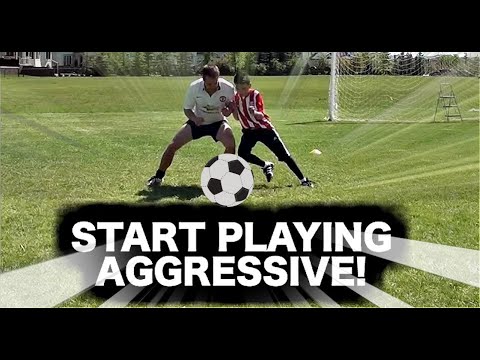How to Teach Your Child to Be Aggressive in Sports?
Contents
Do you want your child to be more aggressive in sports? If so, then you’ll need to teach them how to be aggressive. Here are some tips to help you do just that.
Checkout this video:
Introduction
It is important for children to learn how to be aggressive in sports.Aggressive sportsmanship teaches children how to win and lose gracefully, how to work as part of a team, and how to set and achieve personal goals. aggression can also help children build self-confidence and self-esteem.
While it is important for children to learn how to be aggressive in sports, it is also important for them to understand when aggression is appropriate and when it is not. Children should never be taught to be aggressive towards other players or officials, but should instead focus on being assertive and playing fair.
The Pros of Teaching Your Child to Be Aggressive in Sports
It is important to teach your child to be aggressive in sports because it can help them become more successful in their chosen sport. Aggressive behavior in sports can help your child learn how to win and be more competitive. It can also teach your child how to handle frustration and how to keep their cool in pressure situations.
It can improve their performance
While many parents worry about their child being too aggressive on the playing field, research has shown that there are some benefits to teaching your child to be aggressive in sports. Here are a few of the pros:
It can improve their performance: Studies have shown that athletes who are able to channel their aggression in a positive way tend to perform better than those who don’t.
It can help them handle adversity: If your child is able to be aggressive on the playing field, they will likely be better equipped to handle any setbacks or adversities they face in life.
It can boost their confidence: Children who are able to be aggressive in a controlled way tend to have higher levels of self-confidence. This can carry over into other areas of their life, such as school and social situations.
It can make them more resilient
Studies have shown that children who are taught to be aggressive in sports are more resilient than those who are not. This is because they learn to cope with disappointment and setbacks, and they also learn to handle success.
Also, children who are taught to be aggressive in sports tend to have higher self-esteem and confidence levels. This is because they feel like they can accomplish anything they set their mind to.
It can teach them how to handle adversity
Children who are raised to be aggressive in sports often have an easier time handling adversity. They learn how to deal with losing, how to handle getting hit or knocked down, and how to mentally and emotionally recover from setbacks. While this might not seem like a positive trait at first glance, it’s actually a valuable skill that can translate into other areas of life, such as academics or even relationships.
The Cons of Teaching Your Child to Be Aggressive in Sports
While aggression may help your child win in sports, it can also lead to them being more aggressive in other areas of their life. This can be a problem both at school and at home. Aggressive children are more likely to get into fights, both physical and verbal. They may also struggle to maintain friendships because of their aggressive behavior.
It can lead to injuries
When children play any sport, there’s always the potential for injuries. But when children play aggressively, this potential increases. That’s because aggressive play often leads to accidents and collisions. For example, a child who’s playing aggressively in football may be more likely to get tackle too hard, leading to a concussion or other head injury.
In addition, playing aggressively can sometimes lead tointentional injuries. For example, a child who’s playing hockey may hit another player on purpose in order to injure him or her. This type of intent to injure can lead to serious injuries, such as concussions, broken bones, and even permanent disability.
It can lead to aggressive behavior off the playing field
While it may seem like a good idea to teach your child to be aggressive in sports, there are some potential downsides to this approach. One of the biggest concerns is that it can lead to aggressive behavior off the playing field. If your child is taught that it is acceptable to be aggressive in order to win, they may start to see this as a viable option in other areas of their life, such as in their academic or social lives. Additionally, aggressive behavior can lead to serious injuries, both for your child and for their opponents. If your child does become injured while playing aggressively, this could have a negative impact on their future health and well-being. Finally, aggressive behavior in sports can create an unpleasant and competitive environment for everyone involved, which may not be conducive to learning or having fun.
It can foster a negative attitude
While it’s true that being aggressive can give your child an edge in some sports, it’s important to remember that aggression is a double-edged sword. On the one hand, it can give your child the extra boost they need to win; on the other hand, it can foster a negative attitude both on and off the field.
One of the biggest problems with teaching your child to be aggressive in sports is that it can lead to a sense of entitlement. Your child may start to feel like they deserve to win, and that anyone who gets in their way is simply an obstacle to be overcome. This sense of entitlement can translate into real life, making your child difficult to deal with both at home and at school.
In addition, aggressive behavior often leads to conflict. If your child is constantly trying to bully their way to victory, they’re likely to end up in arguments with both teammates and opponents. This can damage relationships and make it difficult for your child to find friends both on and off the playing field.
How to Teach Your Child to Be Aggressive in Sports
It is important for your child to be aggressive in sports. Sports are a competition and your child should want to win. When your child is aggressive, they are more likely to get the ball, make a tackle, or score a goal.
Talk to your child’s coach
As a parent, you want your child to be successful in whatever they do. You want them to be happy and to feel like they belong. You also want them to be safe. But when it comes to sports, you may find yourself questioning how far you should go to help your child find success.
One area that can be difficult to navigate is teaching your child to be aggressive in sports. On one hand, you don’t want your child to get hurt. On the other hand, you want them to be successful and compete with their peers.
The best way to approach this situation is to talk to your child’s coach. They will have a better understanding of your child’s abilities and what they are capable of handle on the field or court. The coach can also offer guidance on how you can help your child learn to be more aggressive in a healthy way.
Teach your child how to channel their aggression
While you may not want your child to be the most aggressive player on the team, it is important to teach them how to channel their aggression in a positive way. Here are some tips on how to do just that:
1. Teach your child how to control their emotions. It is important that they understand that they can be aggressive without losing control of their emotions.
2. Help them understand the difference between assertiveness and aggressiveness. Assertiveness is being confident and standing up for oneself, while aggressiveness is being needlessly combative or violent.
3. Teach them when it is appropriate to be aggressive. For example, if someone is trying to take their toy or hurt them, it is okay to be assertive and defend themselves. However, there is no need to lash out aggressi
Monitor your child’s progress
As your child practices their sport, it is important to monitor their progress to ensure that they are progressing towards their goal of becoming more aggressive. A good way to do this is to keep track of the number of times they display aggressive behaviors during practice and games. You can also ask their coach for feedback on their progress.
Conclusion
You want your child to be successful in sports, and you know that aggression can be a key factor in achieving success. But how can you teach your child to be aggressive without crossing the line into violent behavior?
Here are some tips:
-Encourage your child to be assertive, not aggressive. Assertiveness means standing up for oneself and being confident, while aggression is about trying to harm or control others.
-Teach your child to use words first, before resorting to physicality. This will help them learn to resolve conflicts peacefully.
-Role model appropriate behavior for your child. If you are calm and assertive, they are more likely to imitate that than if you are aggressive.
-Encourage your child to participate in sports or other activities where they can safely channels their aggression in a positive way.







